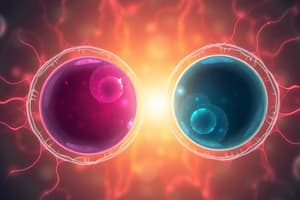Podcast
Questions and Answers
What type of cell results when two cells with n number of chromosomes fuse?
What type of cell results when two cells with n number of chromosomes fuse?
Diploid cell
During which process are gametes formed?
During which process are gametes formed?
During the process of meiosis
What process results in the exchange of genes between homologous chromosomes?
What process results in the exchange of genes between homologous chromosomes?
Crossing over in meiosis, prophase I
Relate the terms meiosis, gametes, and fertilization in 1-2 sentences.
Relate the terms meiosis, gametes, and fertilization in 1-2 sentences.
Hypothesize why plant cells might not need centrioles for mitosis or meiosis?
Hypothesize why plant cells might not need centrioles for mitosis or meiosis?
Explain the differences between dominant and recessive traits.
Explain the differences between dominant and recessive traits.
What might occur in the F3 generation of the curly-eared cat if the F2 generation produced all non-curly-eared cats?
What might occur in the F3 generation of the curly-eared cat if the F2 generation produced all non-curly-eared cats?
If there are 5 boys and no girls in a family, does that increase the likelihood that the 6th offspring will be a girl? Explain.
If there are 5 boys and no girls in a family, does that increase the likelihood that the 6th offspring will be a girl? Explain.
What three processes increase genetic variation?
What three processes increase genetic variation?
Hypothesize how a plant breeder might create a polyploid plant.
Hypothesize how a plant breeder might create a polyploid plant.
How is chromosome gene linkage an exception to the law of independent assortment?
How is chromosome gene linkage an exception to the law of independent assortment?
What is genetic recombination?
What is genetic recombination?
What is the law of segregation?
What is the law of segregation?
Define homozygous and heterozygous.
Define homozygous and heterozygous.
What is the difference between dominance and the law of segregation?
What is the difference between dominance and the law of segregation?
Alleles separate during the production of what?
Alleles separate during the production of what?
Contrast the cells produced by meiosis versus mitosis.
Contrast the cells produced by meiosis versus mitosis.
What cells only go through meiosis?
What cells only go through meiosis?
What occurs during prophase I of meiosis?
What occurs during prophase I of meiosis?
What happens during metaphase I?
What happens during metaphase I?
What happens during anaphase I?
What happens during anaphase I?
What occurs during telophase I?
What occurs during telophase I?
Describe prophase II.
Describe prophase II.
What occurs during metaphase II?
What occurs during metaphase II?
What occurs during anaphase II?
What occurs during anaphase II?
What happens during telophase II?
What happens during telophase II?
What is cytokinesis?
What is cytokinesis?
Flashcards are hidden until you start studying
Study Notes
Cell Division and Genetics
- Diploid cells result from the fusion of two cells containing n chromosomes.
- Gametes are formed through meiosis, a specialized type of cell division.
- Gene exchange occurs during crossing over in prophase I of meiosis.
Meiosis and Fertilization
- Meiosis produces gametes, and when these gametes unite, fertilization takes place.
Plant Cells and Cell Division
- Plant cells do not have centrioles, which might be unnecessary for their mitosis or meiosis due to differences in cell structure.
Genetic Dominance and Variation
- Dominant alleles mask the presence of recessive alleles, while recessive traits remain hidden.
- Homozygous organisms possess two identical alleles for a trait; heterozygous organisms have two different alleles.
Genetic Predictions
- If the F2 generation of curly-eared cats produces only non-curly-eared cats, the F3 generation will also exclusively have non-curly ears.
- Having five boys in a family does not influence the probability of the sixth child being a girl; chances depend on genetic variation.
Genetic Variation Mechanisms
- Genetic variation is increased through independent assortment, crossing over, and random mating during meiosis.
Polyploid Plants
- Plant breeders create polyploid plants by cross-breeding for desirable traits, such as those found in commercially grown wheat.
Gene Linkage
- Chromosome gene linkage acts as an exception to the law of independent assortment, as linked genes do not segregate independently during gamete formation.
Laws of Genetics
- The law of segregation states that alleles for a trait separate during meiosis and unite during fertilization.
- Genetic recombination is produced through independent assortment and crossing over.
Meiosis vs. Mitosis
- Meiosis results in four haploid cells, whereas mitosis results in two identical daughter cells.
- Only reproductive cells undergo meiosis.
Stages of Meiosis
- Prophase I: Homologous chromosomes pair, crossing over occurs, spindles form, and the nuclear envelope breaks down.
- Metaphase I: Centromeres attach to spindle fibers and homologous chromosomes align at the cell's equator.
- Anaphase I: Homologous chromosomes move to opposite poles of the cell.
- Telophase I: Chromosomes uncoil to form two nuclei, and the cell divides.
- Prophase II: Chromosomes condense, spindle fibers form, and attach to chromosomes in each new cell.
- Metaphase II: Chromosomes' centromeres align at the equator of the cell.
- Anaphase II: Centromeres split and sister chromatids separate to opposite poles.
- Telophase II: Four nuclei form as chromosomes reach the poles, and the nuclear membrane reforms.
- Cytokinesis occurs at the end of meiosis II, resulting in four haploid cells.
Studying That Suits You
Use AI to generate personalized quizzes and flashcards to suit your learning preferences.




